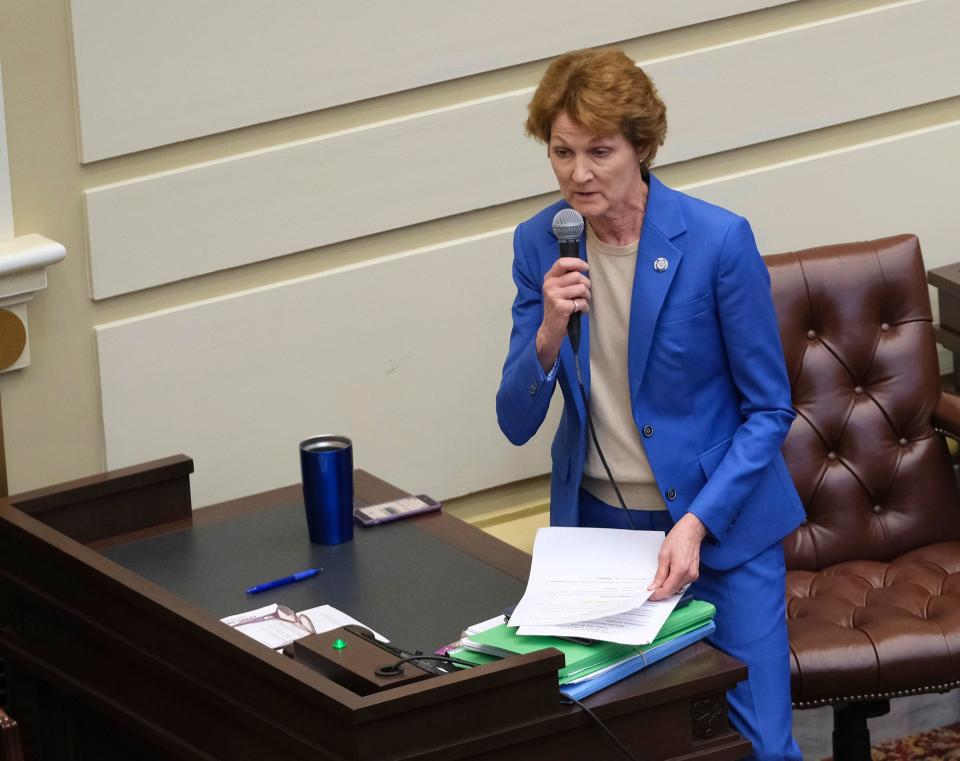Disabled children in Oklahoma can still get spanked at school. Why lawmakers won't change that.

In some Oklahoma school districts the old adage, "spare the rod and spoil the child" still applies.
Even when that child is disabled.
Although a majority of Oklahoma’s public schools have eliminated corporal punishment as a method of addressing student behavior, it’s still an option in at least 130 of the state’s 512 school districts, most of them in more rural areas.
Both the state's largest districts ― Oklahoma City and Tulsa — ban corporal punishment.
But corporal punishment still remains legal in Oklahoma.
Jessica Gilliam, whose elementary-aged son is autistic, recently spoke at an interim legislative hearing on corporal punishment. She told lawmakers her son was bruised and his skin was “shaped from the swats he received” after a discipline incident at the boy’s school in Indianola, a school district in Pittsburg County. “At that moment, I knew it was more than swats,” she said. “This left marks and bruising.”
She said her son was withdrawn when she picked him up from school. She said he cried and said his bottom hurt when he took a shower. “I asked him to turn around and let me see him,” she said. “When he turned around, I screamed in disbelief.”
Gilliam said she reported the incident to the school’s former superintendent. He told me the paddle that was used came from a local state representative. Later that day, she said, the principal called her and apologized.
“He said he had spanked my son like he did his high school students, and I would like to throw in that this man is 6 foot, 3 inches tall and weighs 280 pounds, and these children were around 65 to 70 pounds, and then he told me it may have been a little too hard.”
Gilliam sued the district in 2020, but a Pittsburg County judge ruled in favor of the school.

How many school districts in Oklahoma use corporal punishment?
State law allowed the discipline. Under Title 70, Section 24, local school boards are allowed to decide whether or not corporal punishment will be a part of their school’s discipline code. Oklahoma is one of only 15 states that still allows the practice.
A 2022 survey by the Oklahoma State Department of Education showed that 63 state school districts used corporal punishment on more than 400 students who were covered by the Individuals with Disabilities Education Act in 2021-22.
A report from The Oklahoma Appleseed Center for Law and Justice echoed the finding by the state. “Oklahoma ranked fifth among the states in the number of students who were subjected to corporal punishment in 2017-18, the last year for which we have national data.”
More: Oklahoma lawmakers to discuss use of corporal punishment on students with disabilities
So why is Oklahoma such an outlier? To understand that question, you first have to understand the politics of rural Oklahoma, said professor James Davenport, a political scientist and associate dean at Rose State College.
“Some of this is cultural, quite clearly,” Davenport said. “And culture doesn’t move as quickly as other areas of society.”
Rural Oklahoma, with its strong community connections and a less diverse religious population is centered on local control, he said.
“They are going to be less diverse and quicker to say, ‘Hey, we know our kids, and the school district should be determining the type of punishment, not the state.’”

And the fact that many of the school districts that still use corporal punishment are located in rural areas isn’t lost on Davenport. Rural districts, he said, trend conservative — and that includes political leanings that embrace evangelical Christianity.
“Politically, the rural populations are far more conservative,” he said. “And even though the same ideas are present in the urban setting, they are not the dominate perspective.”
Scott Singleton, a psychology professor at the University of Central Oklahoma, told state lawmakers that using corporal punishment to discipline students with disabilities can cause communication and language challenges and disabled children are “unable to express their needs in conventional ways.”
"Many adverse behaviors occur because they produce an outcome of social interaction and attention — even if it’s negative”, he said.
Some Oklahoma lawmakers pushing back on attempts to ban corporal punishment
A recent news release from two state representatives appears to underscore Davenport’s statement. Shortly after Rep. Jim Talley, R-Stillwater, held an interim hearing on corporal punishment, state Reps. Jim Olsen, R-Roland, and Randy Randleman, R-Eufaula, criticized the study, calling it one-sided “without an opportunity for anybody with opposing viewpoints to present.”
Olsen has been a vocal critic of other lawmakers’ attempts to outlaw corporal punishment. He believes corporal punishment should be a part of proper child training. During the spring legislative session, he debated against Talley’s bill, House Bill 1028.
In his statement, Olsen said lawmakers should base their policy on the Book of Hebrews from the Christian Bible. "It's best to take God at his word and do things his way," he said. "When we do, things turn out much better."
Randleman, a school psychologist, said evidence reviewed by Robert Larzelere of Oklahoma State University looked at three common alternatives to corporal punishment and found that corporal punishment was more effective than the other alternatives as a discipline technique.
Still, while there are those who believe Olsen is on the right track, some religious scholars question Olsen’s use of the Bible as a vehicle for legislation.
More: 'Substantial bruising': Texas high school principal arrested on assault charge in paddling
“It’s not rational,” said the Rev. Shannon Fleck, executive director of the Oklahoma Faith Network. “The Bible shouldn’t be used to legislate.”
Fleck said Scripture should never be used to justify violence.
“There is enough violence in the world,” she said. “Basing the law on the Book of Hebrews is the interpretation of one man. The way one person interprets the Bible is far different from the way a group of people do.”
For Talley and his co-chair, Senate Minority Leader Kay Floyd, ridding the state of corporal punishment won’t happen quickly — it’s going to take several steps.
Talley and Floyd authored House Bill 1028, which passed the House 84-8 in March. And even though the bill only prohibits the use of corporal punishment on students identified with the most significant cognitive disabilities, Talley predicted the measure will continue to be challenged.
He and Floyd said they will try again next year to get HB 1028 to the governor’s desk.
“It’s going to take a lot of work,” he said. “But this needs to happen.”
Floyd said her goal is simple: Eliminate a punishment that can cause long-term and lasting damage on children who are disabled.
“If we are truly committed to helping every child reach their greatest potential, we need to utilize alternative methods for achieving appropriate behaviors that work both in the short-term as well as the long-term,” she said.
House Bill 1028 is currently awaiting a hearing in the Oklahoma Senate. In its current form, the bill prohibits the use of corporal punishment on students identified with the most significant cognitive disabilities: less than 10% of students with disabilities in Oklahoma's public schools.
State lawmakers will return to the Capitol in February for the 2024 legislative session.
This article originally appeared on Oklahoman: Spanking children in schools is still legal in Oklahoma

